The EFF’s bid to rename the Kruger National Park has backfired, leaving Mpumalanga lawmakers humiliated for agreeing to a motion that was found lacking in research.
In their rush to honour a supposed black hero, legislators pushed through a motion to rename the park after “Skukuza” – only to discover the name belonged not to a liberation icon, but to a brutal colonial enforcer.
James Stevenson-Hamilton, the park’s first warden, was so notorious for driving black communities off their land that locals nicknamed him Skukuza, meaning bulldozer.
Far from celebrating resistance, lawmakers had effectively endorsed the very man responsible for evictions at the heart of South Africa’s most famous game reserve.
The motion, introduced without notice, formed part of Heritage Day reflections.
The EFF argued that South Africans remained undermined because many heritage sites still carry the names of colonial figures such as Paul Kruger.
Members of the provincial legislature across party lines backed the call, a rare moment of unity in a chamber often defined by fiery clashes.
When a motion without notice is adopted, it becomes a binding resolution. Such motions are usually reserved for urgent or broadly supported matters and must pass with unanimous consent or a strong majority.
This week, EFF provincial leader Collen Sedibe was man enough to admit to journalists that the party had jumped the gun, but insisted that colonial names should be a thing of the past.
“We are still engaging with the land claimants at Kruger National Park and the people who were staying there because they said Skukuza is not the right name. He was the man who kicked them out of the park,” Sedibe told journalists.
The Department of Culture, Sport and Recreation was quick to clarify that the legislature’s resolution does not change the park’s name. Spokesperson Sibongile Nkosi said while the motion reflects a political position, “it does not override or substitute the official naming process”.
She stressed that renaming a site of Kruger’s magnitude would require extensive national consultation involving the South African Heritage Resources Agency, South African National Parks, affected communities, and possibly the United Nations Educational, Scientific and Cultural Organization.
“The Mpumalanga Provincial Geographical Names Committee (PGNC) acknowledges the motion passed by the provincial legislature. However, we emphasize that no formal application for the renaming of Kruger National Park has been submitted to the PGNC at this stage.”
Nkosi warned that history cannot be glossed over.
“The name ‘Skukuza’ may be contested precisely because of its dual associations – as both a symbol of administrative control and an embodiment of resilience and memory for displaced communities.”
The EFF’s renaming crusade has stumbled elsewhere too. Its bid to have Kruger Mpumalanga International Airport renamed after the late former deputy president David Mabuza collapsed when it emerged the facility is privately owned.
Tourism and business leaders have panned the proposals. Kruger Lowveld Chamber of Business and Tourism CEO Linda Grimbeek called the park motion “a joke”. “We never thought anyone would submit such an unresearched proposal.
“Kruger Park is an iconic destination. If you go anywhere overseas and speak to people, they will know Kruger before they know anything else about South Africa. To change the name of such an iconic place would be nonsensical,” she said.
Primkop Airport Management, which owns and operates Kruger Mpumalanga International Airport, offered a careful statement that avoided politics but highlighted regulation.
“We note the discussion around a proposed name change for Kruger Mpumalanga International Airport. The airport is regulated by the Department of Transport,” said Primkop CEO Grant Ponting.
“We recognise the importance of it as a vital gateway for tourism, commerce and agriculture for South Africans and international visitors.”
The response sidestepped questions on ownership and naming rights but reinforced the airport’s status as a regulated private facility.
For now, the park and airport’s names remain unchanged leaving the EFF accused of turning a symbolic fight against colonialism into a historic own goal.



